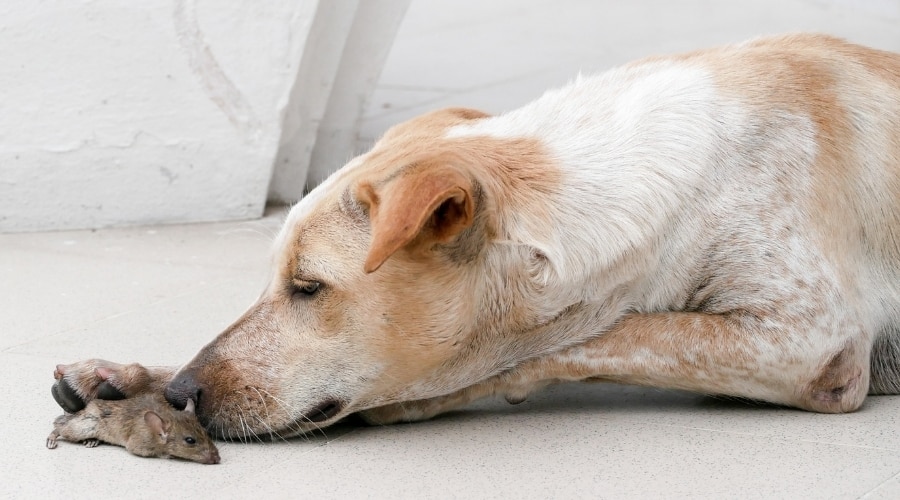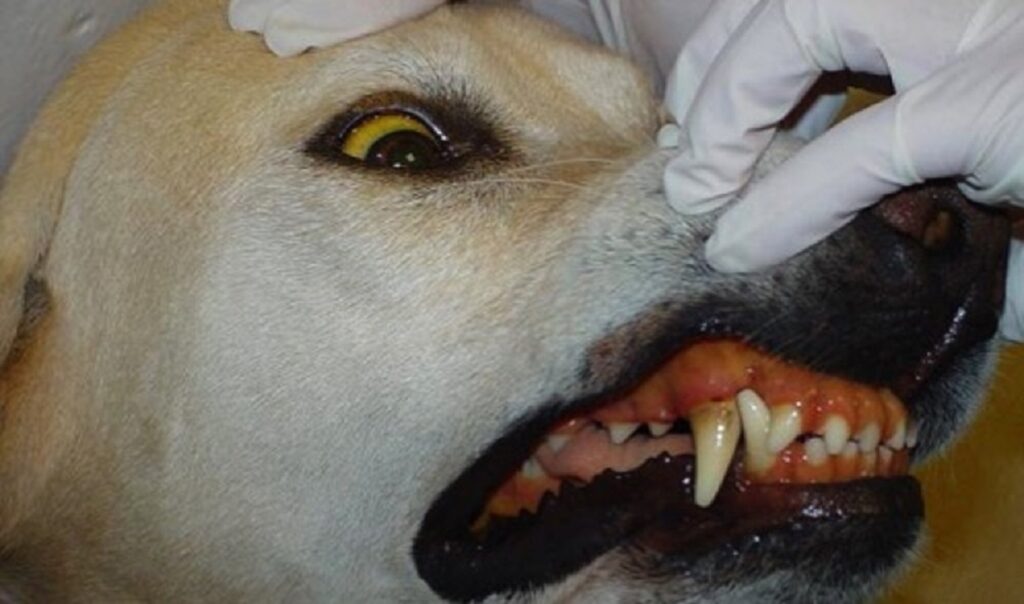Mice are one of the most unwanted pests humans have ever encountered. These mice live in their holes, come out from their holes, cause trouble in the kitchens, and mess up the whole house. Considering the trouble these mice cause, humans must get rid of them in one way or another.
Long ago, even when mouse traps were not available, specialized dogs were there to help get rid of these mice. Some specialized lines of dogs, namely Terrier breed lines, were mainly used in the past for capturing and getting rid of mice from homes, shops, etc. But nowadays, you should not be surprised if you see a normal dog that catches mice.
Your dog may discover a mouse hiding in the hole and eventually enjoys chasing the mouse out of the house. But the main trouble arises when your dog decides to gobble that mouse. What should you do then if such a situation arises with your dog? What is the best way to stop your dog from eating mice and protecting the dog? Keep reading the article to learn more about the issues and solutions related to your dog eating mice and other related things.
My Dog Ate A Mouse: Should I Be Worried Now?

Dogs tend to sniff and eat all kinds of things they find interesting, including those they should not eat, but the issue may arise if the dog consumes a mouse, especially a poisoned mouse. It is impossible to guess what kind of disease the mouse that your dog ate would be carrying, so it is normal for you to get worried in such cases.
The condition becomes worse if the mouse that your dog ate is wild or the other one has consumed any poison before its death. This kind of mouse that has consumed poison can be very dangerous for your dog, causing numerous diseases in dogs that can prove to be fatal.
The poison the mice consumed could be why the dog easily caught the mice. Otherwise, it is not easy to catch mice with a dog due to the expert nature of the mice to escape any situation, especially the traps set to cause them problems.
Although the poison in the mice can be in small amounts, it can still cause serious harm to your dog and its body. If you find that the dog consumed a mouse that was near a populated area or an area where rodenticide is commonly sprayed, immediately refer to a veterinarian.
A veterinarian can perform different processes to treat your dog, and this includes vomiting to remove as much rodenticide and poison from the dog’s body as possible. With the veterinarian’s help, you can remove the toxins from the dog’s body even before they get absorbed.
The veterinarian can use activated charcoal to neutralize the effect of any remaining rodenticide or poison in the dog’s body. Getting the right treatment for your dog is very important because only with the right treatment will your dog be able to recover fully.
What Kinds Of Rodenticides Are There in Dead Mice the Dog Ate?

Since mice cause a lot of trouble for people in one way or another, many rodenticides are available on the market that work differently on the bodies of the mice. Considering the way a particular rodenticide works on mice’s bodies, in the same way, it can harm a dog’s body.
The most common type of rodenticide available on the market is the anti-coagulation type, which is responsible for internal bleeding in mice’s bodies. Some other forms of rodenticides are in the form of highly concentrated vitamin D. They deplete calcium stores in the rodent’s bones: and it eventually leads to kidney failure in the mouse and gradually kills it.
Bromethalin is another type of rodenticide that affects the nervous system of mice, causing rapid deaths. It can take up to 6 days for a mouse to die from the poison it consumes. Their movement becomes slow. This slow movement will allow the dog to capture these mice easily.
To know the harm the dead mouse can do to your dog, you must find the exact reason for the rat’s death or the poison it consumed.
When you bring your dog to the veterinarian, tell the vet about the rat poison that the mice had that your dog ate. This information will help the veterinarian team to be aware of the factors that must be considered while treating such dog. For example, your dog’s veterinarian needs to know the type of poison or rodenticide used for special emergency treatment.
Can Killing A Mouse Make My Dog Sick?

Yes, you will be surprised to know that even if your dog only kills a mouse, it can become sick due to being in contact with the mouse. So remember, it is not important that the dog certainly eats the mouse to get sick, even a contact with mice is enough for the dog to get sick.
Wild mice are more dangerous for your dog as the problems or diseases they carry can easily be transmitted to your dog by only having contact with the mice.
At this point, it is important to know what diseases can spread from mice to your dog. These diseases that mice can spread to your dog include the following.
1. Toxoplasmosis
Toxoplasma gondii is a microscopic parasite that can live in mice, and it is the main cause of a disease named toxoplasmosis in dogs.
The dogs who are young are more prone to diseases, or the immunocompromised dogs are more likely to develop this condition.
The toxoplasmosis gondii can enter your dog’s body from the droppings of infected mice, cats, or other animals.
Toxoplasmosis symptoms in dogs include fever, cough, difficulty breathing, jaundice, seizures, diarrhea, and other symptoms. Even death is possible in some dogs whose immune systems are very weak by this bacteria toxoplasmosis gondii.
If your dog ingests the mouse immediately, bring it to the veterinarian. Also, if you notice the dog suffering from seizures after consuming dead mice, you must consult the veterinarian.
The veterinarian will give you the best advice on what to do and how to treat your dog suffering from seizures.
For the treatment, any antibiotics or medications will be given to your dog to control any such infection from mice in dogs.
2. Intestinal Worms or Roundworms
Wild mice can pick up the roundworms from the wild and surroundings in the form of unhatched eggs. The eggs then hatch inside the gut of the mice, and the larva that comes out lies in the muscle tissues of the mice, waiting to reach further stages.
When the dog eats the mice, along with the mice, the larvae also get ingested inside the body of the dog. The larvae fully mature in the dog’s body, and the parasite lives there, thereby feeding on the nutrition that the dog’s body should get.
This parasite will cause your dog to get weaker with each passing day as the dog will be competing for nutrition with the parasites for its life.
Weight loss, diarrhea, abdominal pain, and vomiting are some of the symptoms your dog gets if it has a roundworm in its body.
In such a case, immediately take the dog to the veterinarian for immediate treatment. The vet will examine the poop of your dog. If the results come to be positive for the presence of roundworms in the dog’s poop: then the vet will suggest some deworming medications for the dog for effective treatment.
3. Leptospirosis

The Leptospira bacteria is the one that is responsible for causing leptospirosis in your dog. So if your dog gets into contact with a mouse’s urine or a place contaminated with mouse urine, there are high chances for your dog to acquire leptospirosis.
Leptospirosis, upon progression, can cause diseases like kidney failure and organ failure in dogs that eventually lead to the dog’s death. Leptospira is mainly passed out in the urine of the mice and tends to stay there for a longer period, especially if warm and moist conditions are available there.
Some dogs will not even show simple signs and symptoms of leptospirosis, but for others, a wide range of signs and symptoms can lead to the dog’s death.
The symptoms of leptospirosis are generally fever, loss of appetite, increased thirst, lethargy, and diarrhea. You should involve the veterinarian if you notice a change in your dog’s behavior, along with the clinical sign lasting more than 24 hours.
Leptospirosis is more harmful to pregnant dogs as, through the blood flow, the infection will go to the puppies. However, in many cases, this infection can spread to humans, particularly children and the elderly preferably. If your dog gets diagnosed with leptospirosis, a proper antibiotic course is available to treat your dog through this.
Fortunately, for those dogs who enjoy hunting mice, a leptospirosis vaccination reduces the risk of infection caused by mice’s urine. Consult with the veterinarian about whether your dog is recommended for this vaccination.
4. Salmonellosis
A group of bacteria known as salmonella is responsible for causing salmonellosis in dogs. These bacteria are typically found in uncooked chicken that has been transferred.
Salmonellosis symptoms include bloody stool or mucus-filled diarrhea, lethargy, weakness, vomiting, and a fever.
The veterinarian will often treat the dog with dehydration or fluid replacement treatment, as this will lead to a lot of water loss or dehydration in your dog. All this information you can get from the national public health agency of the United States’s website, known as the CDC website (Centers for Disease Control and Prevention).
5. Poison
As explained above, there are high chances that the slow speed of mice could be due to the poison that the mice consumed.
Rodenticides always have different mechanisms of action on the mouse’s and dog’s bodies, resulting in varied symptoms. So when you notice your dog behaving weirdly after eating a mouse, take the dog to the veterinarian, properly explaining the rodenticides you used in your house to kill the mice.
How Long Will The Dog Be Sick After Eating A Mouse?

Within 1 to 48 hours of the dog ingesting the mice, you can see the adverse effects the mice have on your dog’s body. The time it will take for the symptoms to show depends upon different factors, including the infection or the poison the mice were carrying, the digestive power of the dog, the number of mice your dog ate, and so on.
To give an exact answer without figuring out all the factors is nearly impossible, but if your dog ingests a mouse that has eaten some kind of poison, the symptoms will be quickly shown in your dog.
The symptoms can vary from mild to severe depending upon the mice’s poison and other factors. It isn’t easy to guess what exactly the dog has picked up, or the time it will take the dog to pick up a certain disease. It would be best if you didn’t assess the time for the disease to occur in your dog by yourself.
Instead, you can contact the pet poison helpline or your veterinarian, who will make an exact diagnosis considering all the factors and provide your dog with proper treatment.
You should contact the veterinarian within a few hours as the time difference matters a lot, and taking more time can cause more trouble for your dog.
Is it Possible For Dogs to Catch Rabies From Mice?
No. Rabies can’t get transmitted to your dog through a mouse. As per some hypotheses given by some scientists, the infection of Rabies can immediately kill a mouse, so Rabies can’t transfer to dogs through the mice.
Even if we are talking about humans, there is no evidence that mice are the reason responsible for human rabies infection.
Can the Bones of Mice Harm the Gut of Your Dog?

Yes it may hurt like the bones of most birds and tiny animals, the bones of mice are also very small. So when the dog eats the mice, there are very few chances for the bones of the mice to cause any perforation or blockage in the dog’s body. But it would be best if you were careful with the cooked bones, as small cooked bones often cause trouble for your dogs.
Dog bones cause a blockage problem in the dog’s intestine that further requires assistance from the veterinarian. Common blockages in a dog’s intestine include pain, diarrhea, vomiting, change in appetite, etc., and such symptoms last for more than 24 hours.
If you are concerned about your dog’s health, you should contact the veterinarian immediately, as an emergency treatment for blockage is also important.
How to Prevent the Dog From Eating Mice?
Sometimes, it can be challenging for you to teach your dog a lot of things, like how to stop eating mice. But thankfully, there are certain things you can do to ensure that your dog is not consuming a mouse anytime soon afterward; read further to know more.
Firstly, you should stop taking your dog to the yard with the highest chance of mice infestation. Next, stop your dog’s access to such places that you know have the expectancy of mice. Remember, a place where you can find mice can be a shed or an outbuilding.
Also, you can install different things to ensure that the dog’s stay is protected from such areas. For prevention, you can easily install fencing, gates, and doors, which can also help greatly to stop mice eating by your dog.
Secondly, if you keep an eye on your dog and monitor it, it will be easy for you to find out whether your dog came into contact with something harmful, like mice or any other animal or not.
Also, to ensure that the mice don’t come to your house, you can ensure this by doing some particular things.
Like all the waste, pet food and other food should be sealed properly to stop mouse infestation.
Lock the garbage bins properly and keep them in a secure container to avoid any trouble.
Warm and moist weather is often a favorite place for mice to grow, so avoid taking your dog to such places no matter how much your dog wants to be there.
Also, instead of using dogs to chase out the mice and invite bigger trouble, you can use the mouse traps available on the market.
Finally, avoid using rat poison in your house, especially if you have a dog, as it may only increase your trouble.
Conclusion
Mice can carry serious diseases, so letting your dog chase them is not a good option. You should contact the veterinarian if you find out that the dog has eaten a mouse.
There can be many issues and problems related to the consumption of mice in dogs, but the exact time the signs and symptoms will be shown in dogs can’t be appropriately measured. So you had better visit the veterinarian, explain the condition, and the vet will give you the right advice.
Meet John Patterson, an accomplished Dog Trainer and a dedicated advocate for building strong human-canine relationships.With years of experience as a Professional Dog Trainer, John firmly believes that well-trained dogs are a reflection of patient guidance and unwavering care. Beyond his training skills, he finds solace in grooming and playing with dogs, nurturing their physical and emotional well-being.

